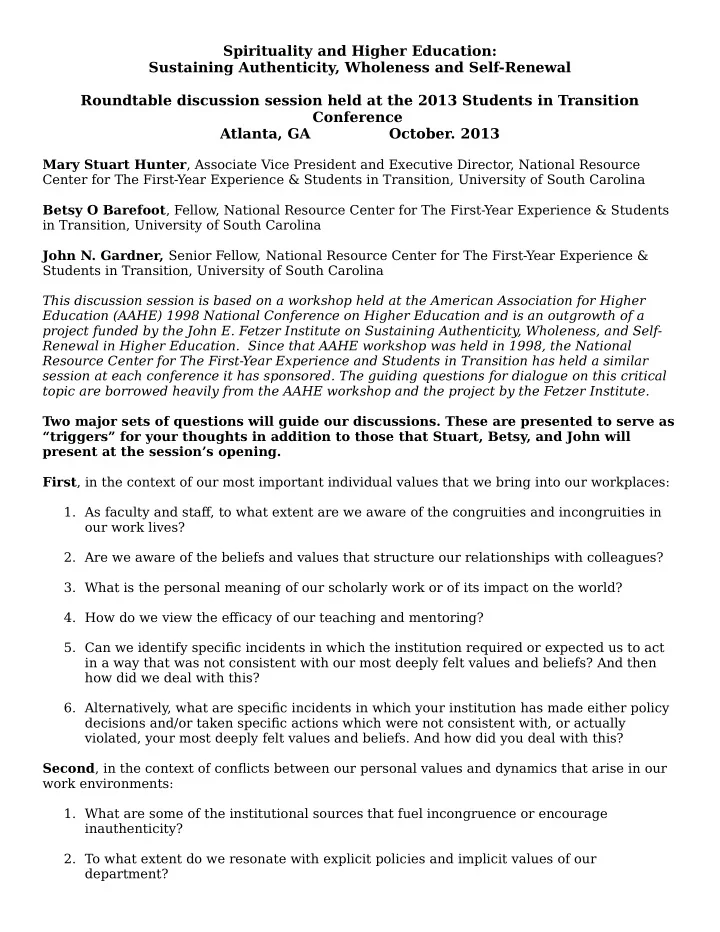

Spirituality and Higher Education: Sustaining Authenticity, Wholeness and Self-Renewal Roundtable discussion session held at the 2013 Students in Transition Conference Atlanta, GA October. 2013 Mary Stuart Hunter , Associate Vice President and Executive Director, National Resource Center for The First-Year Experience & Students in Transition, University of South Carolina Betsy O Barefoot , Fellow, National Resource Center for The First-Year Experience & Students in Transition, University of South Carolina John N. Gardner, Senior Fellow, National Resource Center for The First-Year Experience & Students in Transition, University of South Carolina This discussion session is based on a workshop held at the American Association for Higher Education (AAHE) 1998 National Conference on Higher Education and is an outgrowth of a project funded by the John E. Fetzer Institute on Sustaining Authenticity, Wholeness, and Self- Renewal in Higher Education. Since that AAHE workshop was held in 1998, the National Resource Center for The First-Year Experience and Students in Transition has held a similar session at each conference it has sponsored. The guiding questions for dialogue on this critical topic are borrowed heavily from the AAHE workshop and the project by the Fetzer Institute. Two major sets of questions will guide our discussions. These are presented to serve as “triggers” for your thoughts in addition to those that Stuart, Betsy, and John will present at the session’s opening. First , in the context of our most important individual values that we bring into our workplaces: 1. As faculty and stafg, to what extent are we aware of the congruities and incongruities in our work lives? 2. Are we aware of the beliefs and values that structure our relationships with colleagues? 3. What is the personal meaning of our scholarly work or of its impact on the world? 4. How do we view the efgicacy of our teaching and mentoring? 5. Can we identify specifjc incidents in which the institution required or expected us to act in a way that was not consistent with our most deeply felt values and beliefs? And then how did we deal with this? 6. Alternatively, what are specifjc incidents in which your institution has made either policy decisions and/or taken specifjc actions which were not consistent with, or actually violated, your most deeply felt values and beliefs. And how did you deal with this? Second , in the context of confmicts between our personal values and dynamics that arise in our work environments: 1. What are some of the institutional sources that fuel incongruence or encourage inauthenticity? 2. To what extent do we resonate with explicit policies and implicit values of our department?
3. What departmental or institutional expectations do we, as faculty and stafg, perceive as unfair, counterproductive, or educationally unsound? 4. What kinds of collegial behavior or administrative policies and actions are likely to generate values confmicts or inauthentic behavior? Small Group Discussion Topics After considering the questions above, and listening to Stuart, Betsy, and John share some of their own experiences with the challenges of achieving authenticity and wholeness within our higher education work settings, we would like you to join a group and engage your new colleagues in a discussion as a response to the ideas presented by the facilitators. The following fjve options are possible directions your conversation could take. Please fjrst introduce yourselves and then allow the group process to take over and move the conversation forward. Ideally, we would like to have a brief report from each group summarizing the content of its discussion, with special attention to major areas of concurrence, or the opposite, and unresolved questions that need further consideration. 1. In your institutional life and work, can you think of specifjc times or situations in which you have experienced a clash between your personal values and institutional values and practices? Give specifjc examples of times or occasions in which you felt compelled to compromise your values and beliefs. 2. What kind of collegial behavior or administrative policies generate value confmicts for you or create inauthentic behavior? 3. In what ways are the beliefs and values of your department or institution congruent or incongruent with your own? 4. Are there times when your interactions with students have ofgered opportunities to discuss issues of spirituality, authenticity, and wholeness? How have you reacted to the opportunity? 5. Does your institution provide safe structures or opportunities for the sharing of values? Would the process used for this session facilitate such sharing on your home campus? Resources Spirituality in Higher Education Electronic Newsletter , contact spiritualitynewsletter@gseis.ucla.edu
Alexander W . Astin and Helen S. Astin with the assistance of Anthony L. Antonio, John Astin, and Christine M. Cress (1999) Meaning and Spirituality in the Lives of College Faculty: A Study of Values, Authenticity, and Stress. Los Angeles: Higher Education Research Institute. Arthur Chickering, Jon Dalton, and Liesa Stamm (2005). Encouraging Authenticity and Spirituality in Higher Education. San Franciso: Jossey-Bass.
Recommend
More recommend